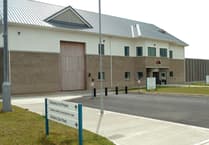The Locum Doctors’ Union has responded to last week’s comments by the leader of a different union about the situation at Noble’s Hospital.
Last week’s lead story in the Manx Independent featured Eric Holmes, of Unite, who suggested that ’greedy’ locum doctors were ’milking the system’ at the hospital.
The Locum Doctors’ Union responded to say that its members have no job security, do not receive pensions or sick pay, and often make huge personal sacrifices, living apart from their families, slowing down their career progression by undertaking out of training work and often overall costing them money from their lifetime earnings (as retirement ages are fixed).
Its statement adds: ’Locum doctors also incur significant additional costs maintaining both their primary and temporary residence and commuting between them as, unlike substantive employees, these are an itinerant workforce with no ties to the island. They do all of this to provide care for those in the Isle of Man.’
Responding to Mr Holmes’ accusations, it says that the read problem is not that budgets are overspent, but rather that they are under-resourced.
’They are not in deficit - they are underfunded,’ says the union.
It adds: ’The starting position must be the cost to provide outstanding care to the people of the Isle of Man - not how much MHKs wish to pay for it. If you pay budget costs you’ll run a no-frills service.’
It continues: ’Healthcare is no different to other sectors in that, providing it for such a small population, is more resource-intensive per capita - especially when there are no locally-trained doctors to serve in local hospitals. Workers are an imported commodity.
’While attempts can be made to make it more efficient, this fundamental fact cannot be changed.
’Locum fees are high because of the remoteness of the island location - which we cannot change - and associated travel factors along with temporary migrant locums being separated from their families.
’If we want to tempt these people to work away from their families, rates must be higher than they can get on their front doorsteps. As the Isle of Man has no medical school or training programmes beyond core medical training level, they cannot train their own medical staff and it is normal that it will be more dependent on locum staff than substantives. This is a problem shared by most remote locations around the globe.
’In the Isle of Man, as in the UK, a key component of the problem is a short-sighted financial attitude towards substantive staff - paying them far less than the free market rate. This is how "training posts" are filled. The poor terms and conditions of substantives drives more doctors into locum work.’
The union says that locum doctors’ pay is driven by the same supply and demand market forces as the pay of every other sector of the economy. Locum doctors are more expensive than their substantive colleagues as there are material differences in the benefits enjoyed by their substantive colleagues.
Locum work slows the doctor’s career progression (reducing career earnings), introduces additional costs, adds regulatory challenge and expense with revalidation and appraisals, and ’removes the hard-won protections that Mr Holmes’ members all enjoy from unfair dismissal, required notice periods, sick pay, pensions, maternity and paternity pay - and all the other benefits of employment employees like Unite’s members will likely take for granted’.
The statement continues: ’As regards the particularly ill-judged, incendiary, and patently counterfactual comment claiming locums have a "monopoly", this is factually incorrect, there is no monopoly. All the locums are separate contractors competing under market conditions, just like in the rest of the economy.
’To command a good rate a doctor must have a good CV, the right skillset and experience, and be skilled in negotiation. One hopes the people of the Isle of Man would favour attempting to attract and retain the best medical minds possible for the island.
’There is a failed anti-competitive attempt at the opposite of a monopoly (a monopsony) by management attempts at price-fixing (or capped rates). This is not working as locums vote with their feet and work anywhere they wish within the British Isles or wider world. The risk of attempting to offer rates at levels less than free market rates is that it will prevent the island attracting a high calibre of healthcare worker which could adversely affect outcomes for patients.
’Lastly, we would add that we are keen to work with Unite, and other Trade Associations, to help them advance their members’ interests going forward.’


-(1).jpeg?width=209&height=140&crop=209:145,smart&quality=75)


Comments
This article has no comments yet. Be the first to leave a comment.